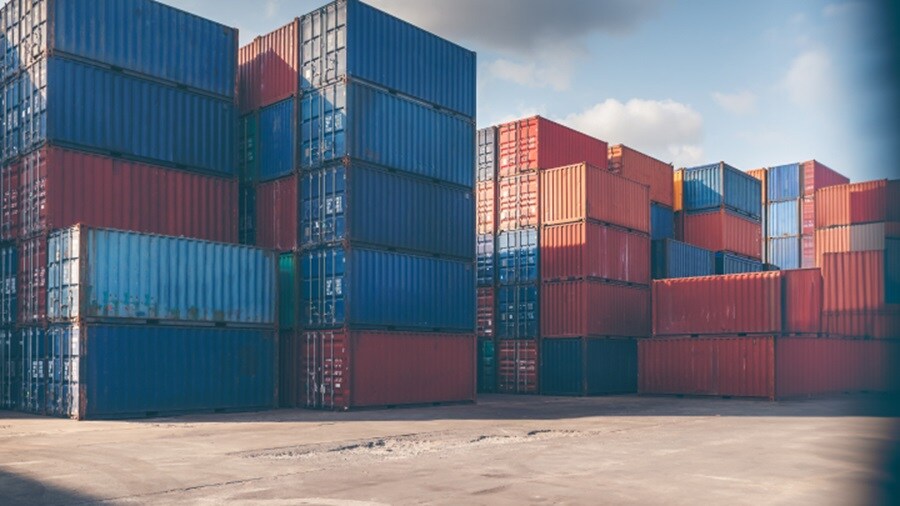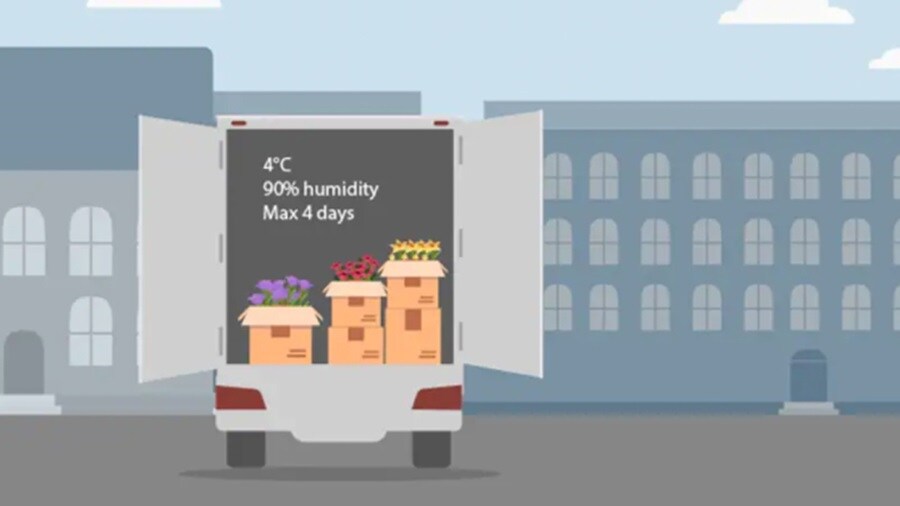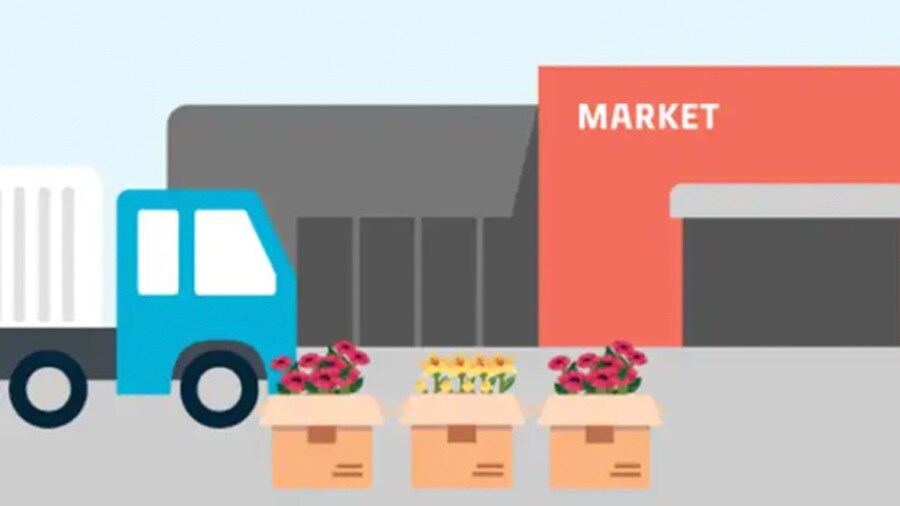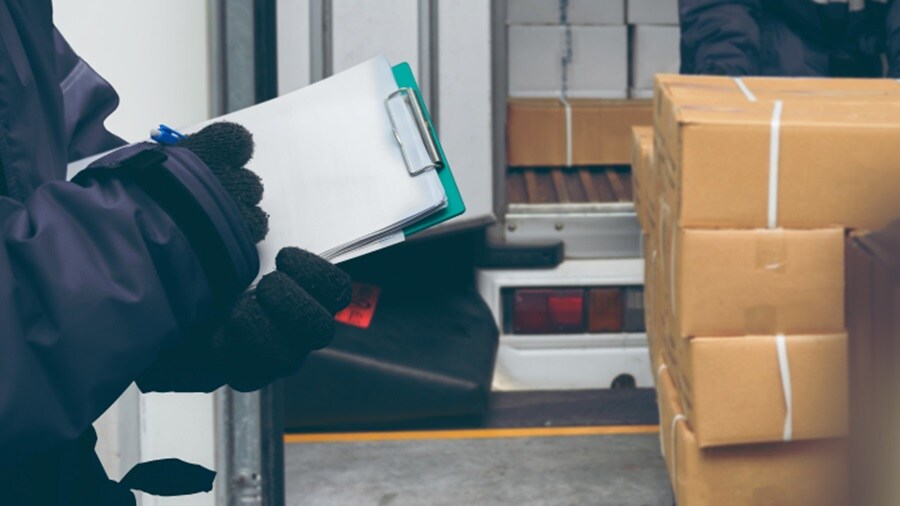Maersk Customs Services ensures your temperature-controlled goods move through customs seamlessly, without any last-minute delays.
Tell us what customs solution your business needs.

A floral expedition – Transporting flowers with unwavering freshness
Flower, like other commodities, requires same level of services to ensure they reach their destination at the right time and in perfect conditions. Because of the temperature-sensitive nature of these cargo (in this case flowers), time is key, and to ensure the quality remain the same as when they leave the farm, it requires a hassle-free and unbroken cold chain journey.
Also, peak season and special occasions put an extra layer of pressure on the cold chain journey to be straightforward and efficient on every aspect.
The new Import of Products, Animals, Food and Feed System (IPAFFS) rules came into force on 1 January 2022 for imports into Great Britain. Prior to that, the effects of trading with the EU after Brexit were partially mitigated by a 175-day grace period for customs entries.
Valentine’s Day was the first proper test of post-Brexit supply chains. The cost of a bunch of flowers had increased by up to 2X this year compared to last Valentine's Day, partly because of tariffs imposed by the European Union post Brexit.
The Fresh Produce Consortium estimates that the new post-Brexit customs rules and tariffs will add £100 million to the cost of importing flowers to the UK. For a flower importer, this rounds up to an additional £200 per load.

Smooth border crossings in and out of the UK
Cold stored product lines have attracted higher than normal delays since IPAFFS came into force, which suggests that the new rules are causing significant friction for UK-based importers. IPAFFS is the system used to pre-notify the arrival of imports of live animals, animal products, plants and plant products, high-risk food and feed not of animal origin, into Great Britain.
This contributes to achieving an unbroken and truly integrated cold chain that ensures the quality is maintained along the journey and that it reaches its destination on time.
Customs expertise
In 2020, we expanded our coverage and teams vastly across Europe. We have cold-chain experts on both sides of the border to ensure all documentation is handled with the utmost compliance enabling for more smooth and speedier clearances at the border.
Manpower to match demand spike
In preparation for peak season, festive periods and special occasions, we ensure additional workforce to handle all clearances in time.
Internal synergies
Our UK teams have close alignment and cooperation with the teams in Mainland Europe and coordinate on both sides of the border for seamless clearances.

Navigating Brexit complexity with integrated customs services
Maersk Customs Services helped a customer speed up cross-border deliveries by managing customs, both at origin and destination. With 80% of the flowers sold in the UK imported from the Netherlands, Maersk ensured that their customer was able to navigate the Brexit landscape and facilitate the surge in demand in time for Mother's Day.
The customer is one of the UK’s leading temperature-controlled logistics providers, specialising in floriculture and other fresh produce, and conducts daily deliveries to several major UK supermarkets.
With multiple delivery locations situated across the southern and northern regions of the UK, completing all the required declarations for their goods as and when they are needed has become an increasingly laborious and manual process. Prior to Brexit, the customer did not face any issues with customs when sending their hauliers across the British border.

When it comes to cold chain logistics, why is customs so critical for your integrated supply chain?
Cut flowers must be kept at a refrigerated temperature of around 4°C, with humidity levels maintained around 90% during their transportation. This helps avoid degradations such as the browning on petals and mould growth. However, even in refrigerated containers, the time in transport cannot exceed more than four days due to their fragility. Exporters face the challenge of keeping their produce fresh in transit to ensure they can reach their final destination on time.
Utilising efficient logistical processes and avoiding long waiting times at customs is essential in preventing goods from perishing during transit.
Whilst flowers are gifted throughout the year, annual festivities create a significant surge in demand during peak seasons. This can cause issues in transit, as exporters deal with large fluctuations in shipments, at times exceeding 100 shipments a day. The customer was seeking to partner with a customs specialist who could ensure that they continued to operate post-Brexit, without tarnishing their standing. The customer decided to start utilising Maersk Customs Services in preparation for the changes that would come into effect post Brexit.

Complying with the Brexit processes in time for peak season
To soften the impact of post-Brexit transition period, businesses operating cross-border were empowered to continue exporting into the UK with relative ease.
Once the relevant paperwork had been handed over, including the newly required Procedure for Electronic Application for Certificates from the Horticultural Marketing Inspectorate (PEACH) declaration, the team at Maersk Customs Services could begin to prepare the documentation required to ensure the necessary plant health and market standards controls.
This was done as early as possible due to the peak season, ensuring that the cut flowers did not face unnecessary delays and perish whilst waiting to clear customs.
This foresight enabled Maersk Customs Services to handle over 100 customs inspections in the rush to deliver flowers in time for Mother's Day in the UK, with much of the produce being sent to a storage facility in Middlesbrough.
We were committed to tailoring our services, making sure the customer was able to satisfy the UK supermarkets’ surge in demand for cut flowers.
With a specially created team, combining staff from the Netherlands and the UK, Maersk Customs Services adapted their offering to provide PEACH declarations for the first time. Their dedicated efforts ensured that all the declaration forms were completed over the weekend to guarantee all border crossings and customs checks in the UK were conducted efficiently.

Continuing to navigate the further post-Brexit changes
EU-based companies exporting goods to the UK now have to face the entire burden of customs declarations at the point of importation. This includes the requirement of completing the import declaration prior to the haulier arriving in the UK.
The UK border's new digital system, the Goods Vehicle Movement Service (GMVS), is now in full force, and exporters need to issue a Goods Movement Reference (GMR) that links all their declaration references together.
This enables each haulage driver to efficiently provide evidence that their goods onboard have pre-lodged all their required declarations within one GMR in real time, in theory.
Under the new GVMS system, exporters of time-sensitive products can no longer manually complete their declarations last minute after loading 50-60 haulage trucks. To guarantee businesses based in the European Union can continue exporting to the UK without disruption under the new changes, Maersk Customs Services’ range of custom services ensures that every process is delivered on time.
We are ready to support you on your export journeys. Our experts, based in office locations across the globe, are here to help you improve your trade performance, enhance your operations, and optimise your customs management. Along with our operational services, we also provide software solutions, consultancy, and training, to enhance your integrated supply chain.
Ready to reap the benefits of integrating customs services into your supply chain?
无论您需要什么,我们都可以随时为您提供帮助
I agree to receive logistics related news and marketing updates by email, phone, messaging services (e.g. WhatsApp) and other digital platforms, including but not limited to social media (e.g., LinkedIn) from A. P. Moller-Maersk and its affiliated companies (see latest company overview). I understand that I can opt out of such Maersk communications at any time by clicking the unsubscribe link. To see how we use your personal data, please read our Privacy Notification.
By completing this form, you confirm that you agree to the use of your personal data by Maersk as described in our Privacy Notification.
